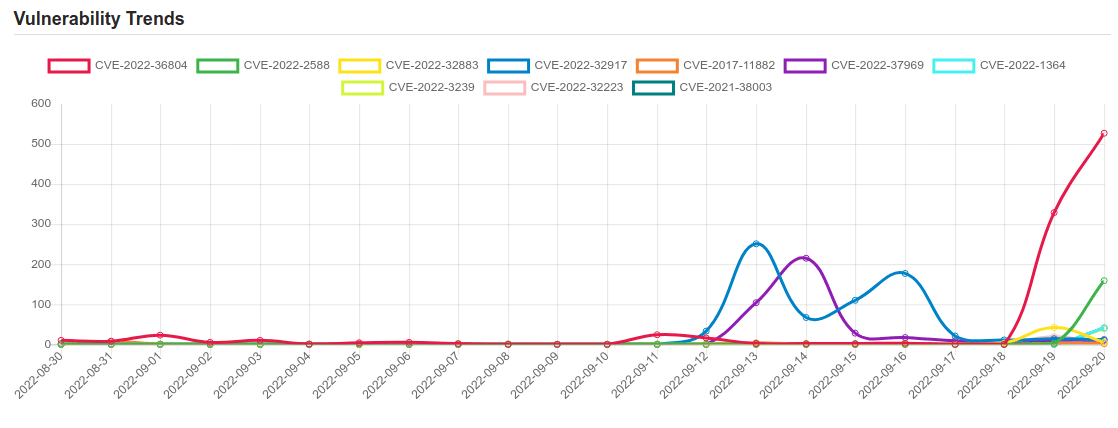Daily Vulnerability Trends: Wed Sep 21 2022

| CVE NAME | CVE Description |
| CVE-2022-3239 | A flaw use after free in the Linux kernel video4linux driver was found in the way user triggers em28xx_usb_probe() for the Empia 28xx based TV cards. A local user could use this flaw to crash the system or potentially escalate their privileges on the system. |
| CVE-2022-32223 | Node.js is vulnerable to Hijack Execution Flow: DLL Hijacking under certain conditions on Windows platforms.This vulnerability can be exploited if the victim has the following dependencies on a Windows machine:* OpenSSL has been installed and “C:\Program Files\Common Files\SSL\openssl.cnf” exists.Whenever the above conditions are present, `node.exe` will search for `providers.dll` in the current user directory.After that, `node.exe` will try to search for `providers.dll` by the DLL Search Order in Windows.It is possible for an attacker to place the malicious file `providers.dll` under a variety of paths and exploit this vulnerability. |
| CVE-2021-38003 | Inappropriate implementation in V8 in Google Chrome prior to 95.0.4638.69 allowed a remote attacker to potentially exploit heap corruption via a crafted HTML page. |
| CVE-2022-34728 | Windows Graphics Component Information Disclosure Vulnerability. This CVE ID is unique from CVE-2022-35837, CVE-2022-38006. |
| CVE-2022-34917 | A security vulnerability has been identified in Apache Kafka. It affects all releases since 2.8.0. The vulnerability allows malicious unauthenticated clients to allocate large amounts of memory on brokers. This can lead to brokers hitting OutOfMemoryException and causing denial of service. Example scenarios: – Kafka cluster without authentication: Any clients able to establish a network connection to a broker can trigger the issue. – Kafka cluster with SASL authentication: Any clients able to establish a network connection to a broker, without the need for valid SASL credentials, can trigger the issue. – Kafka cluster with TLS authentication: Only clients able to successfully authenticate via TLS can trigger the issue. We advise the users to upgrade the Kafka installations to one of the 3.2.3, 3.1.2, 3.0.2, 2.8.2 versions. |
| CVE-2022-37954 | DirectX Graphics Kernel Elevation of Privilege Vulnerability. |
| CVE-2022-39197 | No description provided |
| CVE-2022-35823 | Microsoft SharePoint Remote Code Execution Vulnerability. |
| CVE-2022-40286 | No description provided |
| CVE-2022-0143 | When the LDAP connector is started with StartTLS configured, unauthenticated access is granted. This issue affects: all versions of the LDAP connector prior to 1.5.20.9. The LDAP connector is bundled with Identity Management (IDM) and Remote Connector Server (RCS) |
| CVE-2022-39955 | The OWASP ModSecurity Core Rule Set (CRS) is affected by a partial rule set bypass by submitting a specially crafted HTTP Content-Type header field that indicates multiple character encoding schemes. A vulnerable back-end can potentially be exploited by declaring multiple Content-Type “charset” names and therefore bypassing the configurable CRS Content-Type header “charset” allow list. An encoded payload can bypass CRS detection this way and may then be decoded by the backend. The legacy CRS versions 3.0.x and 3.1.x are affected, as well as the currently supported versions 3.2.1 and 3.3.2. Integrators and users are advised to upgrade to 3.2.2 and 3.3.3 respectively. |
| CVE-2022-3172 | No description provided |
| CVE-2022-3141 | The Translate Multilingual sites WordPress plugin before 2.3.3 is vulnerable to an authenticated SQL injection. By adding a new language (via the settings page) containing specific special characters, the backticks in the SQL query can be surpassed and a time-based blind payload can be injected. |
| CVE-2022-36804 | Multiple API endpoints in Atlassian Bitbucket Server and Data Center 7.0.0 before version 7.6.17, from version 7.7.0 before version 7.17.10, from version 7.18.0 before version 7.21.4, from version 8.0.0 before version 8.0.3, from version 8.1.0 before version 8.1.3, and from version 8.2.0 before version 8.2.2, and from version 8.3.0 before 8.3.1 allows remote attackers with read permissions to a public or private Bitbucket repository to execute arbitrary code by sending a malicious HTTP request. This vulnerability was reported via our Bug Bounty Program by TheGrandPew. |
| CVE-2022-2588 | No description provided |
| CVE-2022-32883 | A logic issue was addressed with improved restrictions. This issue is fixed in macOS Monterey 12.6, iOS 15.7 and iPadOS 15.7, iOS 16, macOS Big Sur 11.7. An app may be able to read sensitive location information. |
| CVE-2022-32917 | The issue was addressed with improved bounds checks. This issue is fixed in macOS Monterey 12.6, iOS 15.7 and iPadOS 15.7, iOS 16, macOS Big Sur 11.7. An application may be able to execute arbitrary code with kernel privileges. Apple is aware of a report that this issue may have been actively exploited.. |
| CVE-2017-11882 | Microsoft Office 2007 Service Pack 3, Microsoft Office 2010 Service Pack 2, Microsoft Office 2013 Service Pack 1, and Microsoft Office 2016 allow an attacker to run arbitrary code in the context of the current user by failing to properly handle objects in memory, aka “Microsoft Office Memory Corruption Vulnerability”. This CVE ID is unique from CVE-2017-11884. |
| CVE-2022-37969 | Windows Common Log File System Driver Elevation of Privilege Vulnerability. This CVE ID is unique from CVE-2022-35803. |
| CVE-2022-1364 | Google Chrome V8 code execution | CVE-2022-1364 |
A considerable amount of time and effort goes into maintaining this website, creating backend automation and creating new features and content for you to make actionable intelligence decisions. Everyone that supports the site helps enable new functionality.
If you like the site, please support us on Patreon using the button below

To keep up to date follow us on the below channels.






